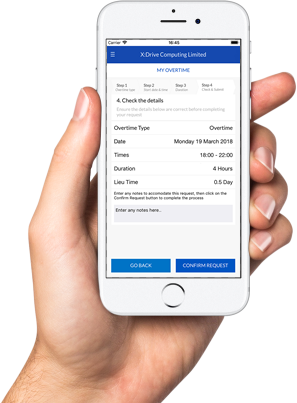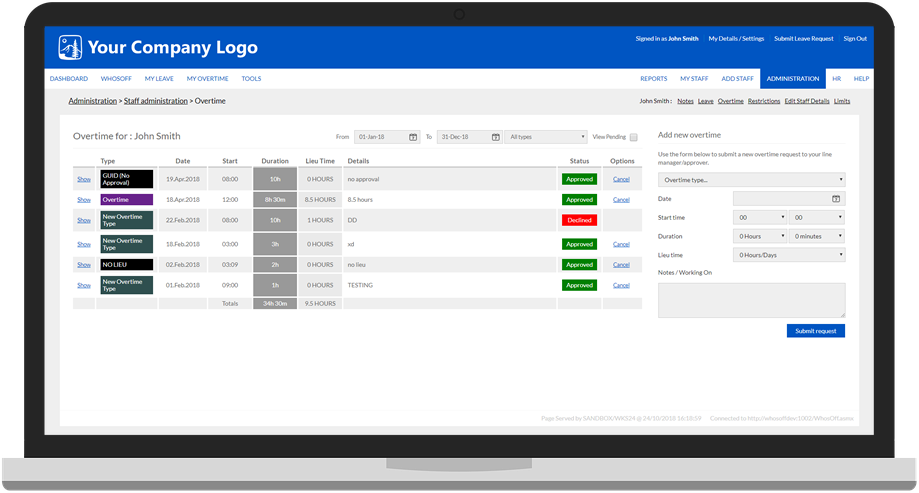Even in the best-run businesses, sometimes you need to boost your staffing levels. Whether work is particularly busy, or many people are on holiday, extra hands are required to keep things moving. But what’s the best way to incentivise your employees to take on further hours?
For most companies, the choice is between offering people time off in lieu or paying them to work overtime. Let’s look at the differences between the two set ups – so you can decide which is the best option for your firm.

What is time off in lieu – and how is it different from overtime?
If you’re new to overtime arrangements, time off in lieu (or TOIL, as it’s often referred to) is a system where staff can earn paid leave for working additional hours.
As an employer, you can choose whether to offer TOIL in hours or days. You can also decide whether it’s like-for-like (an extra day’s holiday for every day of overtime worked) or you want to instigate a different arrangement. For example, you want to give employees a whole day’s TOIL for working half a day at the weekend.
TOIL is actually a form of overtime, as it’s giving staff the chance to earn additional benefits in return for working further hours. However, the difference is that traditional overtime is paid, whereas the compensation for TOIL is more time off.
It’s worth considering both approaches, as they have different benefits. Paid overtime can be a very attractive prospect to colleagues on a tight budget, or who are saving up for a major milestone such as a long-haul holiday or a deposit for their first property. It’s a double opportunity for savers, as they aren’t out spending money when they’re busy working.
Why do UK companies choose to offer TOIL?
Extra time off is a strong staff perk. Many team members are happy to earn leave as a way of topping up their holiday entitlement. For example, working parents may choose to do additional days during term time so they can spend the school holidays with their children. It’s a simple way to change the work/life balance without losing out on pay.
TOIL is also attractive from an employer’s perspective, as you don’t have to supplement salaries for the overtime people work. There is a financial aspect in that lieu time is paid leave, but staff costs remain regular and predictable – which helps with cash flow.
It’s also easier to establish a standardised system for managing UK time off in lieu. With paid overtime there are more ‘grey areas’. For example:
- Where is the line between staff deciding to stay late to finish something off and them working formal, financially compensated overtime?
- Should your company offer the same overtime rate for all additional hours, or pay double for Bank Holidays and weekends?
- Does overtime need to be formally arranged and signed off in advance, or do line managers have the right to give verbal permission to cover last minute requirements?
- Should you cap the number of possible overtime hours per month to avoid an unexpectedly large wages bill?
A set structure for time off in lieu can be developed and launched from the start, so there are no nasty surprises along the way. But for a smooth-running arrangement from day one, make sure your complete process – from when staff can earn TOIL to who approves the overtime – is written into company policy documents and made clear to people before they agree to work extra hours.
Which is better: TOIL or overtime?
As a UK employer, you have the right to choose whether you offer any kind of compensation for working extra shifts – let alone whether it’s paid overtime or TOIL. However, introducing a formal reward system can help you to fill scheduling gaps quicker and keep staff morale high.
TOIL is certainly more cost-effective than paying for your team’s overtime, but you need to make sure it’s managed effectively. Every time off in lieu arrangement needs to be approved by line managers or HR in advance, added to people’s leave allowance when it’s been completed, and taken by employees as part of their paid annual leave package. Keeping up-to-date with these arrangements is no mean feat!
It’s also important that opportunities to earn TOIL are managed fairly, to stop a small handful of people unfairly accruing extra leave. And when staff do earn time off in lieu, you may want to set limits on how long they have to use it – stopping them from building up a huge bank of leave to be taken in bulk at the end of the holiday year.
If you don’t keep track of whether employees are taking their TOIL, you could get trapped in a vicious cycle of being understaffed and having to offer even more time off in lieu to fill the staffing gaps.

What’s the best way to manage staff overtime?
There are practical challenges to consider with both overtime and TOIL. But administrating either approach is made easier with the right support systems in place.
A growing number of companies are managing staff leave online to streamline the holiday process. And you can factor UK time off in lieu into this arrangement by choosing leave management software with a built-in TOIL feature.

Going digital makes the whole process much easier to coordinate, as requests can be approved centrally. Lieu time is added directly to each person’s leave allowance, and you can see exactly how much time off team members have left to use. You can also keep track of how much TOIL each colleague has accrued, to make sure opportunities aren’t going to the same people.
Equally, the right software can also facilitate paid overtime systems, by recording additional hours worked each month so you can pull overtime reports for payroll. This even gives you the freedom to offer a mix of salaried overtime and time off in lieu!
In a busy business, you want to focus on operations – not administration. Using a single system for managing staff holiday, TOIL and paid overtime makes logistics much simpler. You can give people the opportunity to earn more perks without it adding to your HR workload.
WhosOff software enables companies to track time off in lieu alongside staff holiday and report overtime direct to payroll. Book your free WhosOff demo to find out more.

